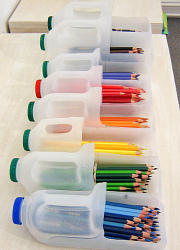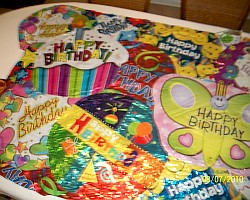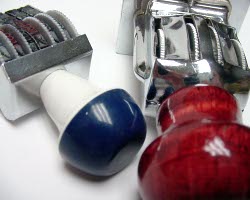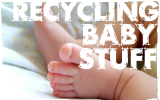 We’ve had an email from Kate/Glitter Pixie:
We’ve had an email from Kate/Glitter Pixie:
Hi, I wonder if the Recycle This community can help. My husband and I have finally moved into a house with outdoor space and want to seize the opportunity to begin composting. However, our yard is completely concreted over so a normal compost bin won’t work. I’ve done a bit of research and think a wormery might be the ticket but they are so expensive! I just want to make a haven for the little wriggly guys we buy, so does anyone have any neat ideas about how to build a wormery and what to use? (obviously reusing general household junk where possible). Thanks so much you guys, absolutely love the site, you are awesome!
(She’s right – you guys in the Recycle This community are awesome!)
Normal compost bins would work on concrete – we just had a piece of wood underneath our open-bottomed one at our old house to facilitate air circulation and moving it around (although we have yet to move it to our new house – that’s going to be quite a effort!) – but wormeries are great too, working a bit quicker so don’t need to be as big – plus who doesn’t want 1000 new wriggly pets? ;)
I’m tempted to build a wormery too for dealing with dog & cat poo (the output can’t be used on veg, which limits our use of it here but better than it going to landfill) so any suggestions?
A lot of the commercial ones I’ve seen have been tray-based to allow easy rotation/access to the new vermicompost. The trays have mesh bottoms to allow the worms to move constantly upwards in search of food – when they reach the top, whip the bottom tray out to the top and start filling that one instead. The trays should fit together snugly – the bottoms touching if it wasn’t for the waste matter – rather than stacked to allow the worms to travel about. They also tend to have a drip tray at the bottom for collecting liquid run-off (which is a great fertiliser).
There are also ones more like purpose bought compost heaps – with an access hatch at the bottom. Possibly easier to make but apparently harder to keep healthy when you’re new to wormerying.
Also any suggestions for where to get the worms? Any types of worms to look out for/avoid?
Categories: garden, reverse this
Posted by louisa
on 17 August 2010
 I discovered something amazing the other day: in four and a half years of running this site, after asking “how can I recycle this?” about over 850 different things, we somehow have managed to miss mentioning magazines. We’ve covered the plastic baggies they’re delivered in and various similar paper items like catalogues – but not magazines. Shocking!
I discovered something amazing the other day: in four and a half years of running this site, after asking “how can I recycle this?” about over 850 different things, we somehow have managed to miss mentioning magazines. We’ve covered the plastic baggies they’re delivered in and various similar paper items like catalogues – but not magazines. Shocking!
The discovery happened because a friend of ours has 300+ old New Scientist magazines that he no longer wants and would like a green option for disposing of them.
A few years ago, many paper recycling bins couldn’t accept glossy paper – they were either office paper or newspaper only – but that’s changed now and magazines can be recycled in most paper bins so as a minimum, our friend could do that. He could also try giving them away on his local Freecycle/Freegle group – the magazines will be out of date from a news point of view but someone still might want to read the not so time critical articles.
For smaller quantities of magazines, there are a lot of examples of people re-using magazines for crafts – often using rolled up pages to make photo frames or ornamental bowls.
Any other suggestions?
Categories: household, items, paper & stationery
Posted by louisa
on 16 August 2010

- I’m a big fan of reusing milk bottles for all sorts of things and this idea for using them as stationery organisers is fantastic. If they were for use by little delicate hands, I’d be tempted to sticky-tape the cut edges to make them less sharp.
- Kristin from Craft Leftovers used the offcuts from fitting a bamboo blind to make coordinating twined coasters.
- Jan McNeil, a Sculpture & Photography student from the University of Ulster, emailed to ask if anyone has any old baby dummies/pacifiers lying around – she wants them for an art project. Get in touch if you’ve got some – or have any ideas for where she might be able to get them from – and I’ll pass your details/suggestions along.
- I love the idea of this toothbrush holder made out of old toothpaste tubes. (Although I’d want to make sure it was easy to clean – which, with the lips, I’m not sure it would be in this design).
- This reusable lunch bag how-to uses new shower curtains but it could equally be made from a clean old one. A great way to reuse to reduce.
 Someone – a name didn’t make it through so I don’t know who – sent over some photos of a birthday table cloth made from old balloons: “I recycle my birthday ballons by gluing them to a clear plastic sheet, gotten in the fabric dept. They make a cute table cover for the party!”
Someone – a name didn’t make it through so I don’t know who – sent over some photos of a birthday table cloth made from old balloons: “I recycle my birthday ballons by gluing them to a clear plastic sheet, gotten in the fabric dept. They make a cute table cover for the party!”
Categories: art & crafts using recycled stuff, bathroom, packaging
Posted by louisa
on 10 August 2010
 We’ve had an email from Kathy asking about getting rid of her children’s old jigsaws:
We’ve had an email from Kathy asking about getting rid of her children’s old jigsaws:
I just know they’ve got pieces missing so would feel bad about giving them to a charity shop. They’re cardboard with a shiny paper top so they could be recycled?
Probably – as long as it’s just paper and not plastic laminate. Most (but not all) paper recycling bins take light card & glossy paper but best to check the advice in your area.
Since it’s getting to the dog days of the summer holidays and they’ll be bored, perhaps use child labour to do the jigsaws and check for missing pieces, then you’ll know what’s missing. If it’s not an important piece, you could mark on the box what is missing and some charity shops/thrift shops still might take them.
Other than that, I’ve seen old puzzle pieces used as decorations in a number of craft projects – photo frames & on ornaments and to make Christmas decorations (wreaths & baubles).
Any other suggestions?
(Photo by pzado)
Categories: Christmas, hobbies, household, items, toys
Posted by louisa
on 9 August 2010
 We’ve had an email from Lise, asking:
We’ve had an email from Lise, asking:
How can rubber stamps be recycled? I found a box full in the stationery cupboard from two department name changes ago!
Given the department name comment, I imagine these are custom ones, not generic “approved” or date stamps – I’d put the latter on eBay or Freecycle/Freegle because they’re still very useful in their own right. The former ones will be less reusable but I’d have loved to play with them when I was a kid (my childhood roleplaying was surprisingly bureaucratic; when I used to play ‘school’, I spent the whole time working out class lists & timetables for said classes) (really).
Depending on the construction of the stamps, you (or someone else) might be able to take them apart and reuse them to make new stamps – replacing the stamp itself but reusing the handles or the mechanism if it’s a self-inking one. Again, eBay/Freecycle/Freegle if you don’t want to give it a go yourself. If they’re very nice old ones, a local stampmaker also might want them to reuse as antique stamps.
If you actually wanted to recycle them, you’d have to break them up into their component parts too – all the ones I’ve seen have been mixed materials so they’d have to be split apart and recycled individually.
Any other suggestions?
Categories: items, office, paper & stationery
Posted by louisa
on 6 August 2010
 We’ve had an email from Kate/Glitter Pixie:
We’ve had an email from Kate/Glitter Pixie:


 I discovered something amazing the other day: in four and a half years of running this site, after asking “how can I recycle this?” about over 850 different things, we somehow have managed to miss mentioning magazines. We’ve covered
I discovered something amazing the other day: in four and a half years of running this site, after asking “how can I recycle this?” about over 850 different things, we somehow have managed to miss mentioning magazines. We’ve covered 
 Someone – a name didn’t make it through so I don’t know who – sent over some photos of a birthday table cloth made from old balloons: “I recycle my birthday ballons by gluing them to a clear plastic sheet, gotten in the fabric dept. They make a cute table cover for the party!”
Someone – a name didn’t make it through so I don’t know who – sent over some photos of a birthday table cloth made from old balloons: “I recycle my birthday ballons by gluing them to a clear plastic sheet, gotten in the fabric dept. They make a cute table cover for the party!” We’ve had an email from Kathy asking about getting rid of her children’s old jigsaws:
We’ve had an email from Kathy asking about getting rid of her children’s old jigsaws: We’ve had an email from Lise, asking:
We’ve had an email from Lise, asking:














